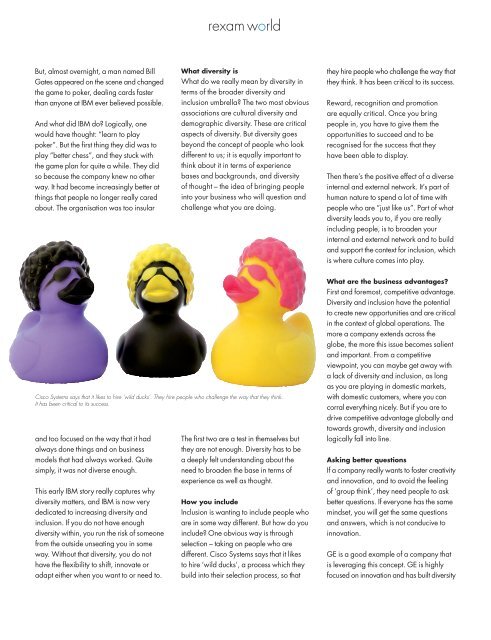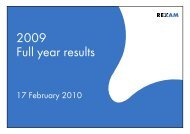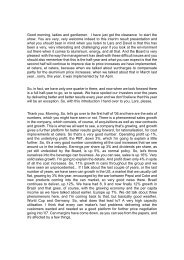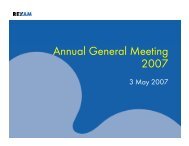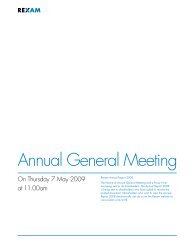All case studies
All case studies
All case studies
You also want an ePaper? Increase the reach of your titles
YUMPU automatically turns print PDFs into web optimized ePapers that Google loves.
But, almost overnight, a man named Bill<br />
Gates appeared on the scene and changed<br />
the game to poker, dealing cards faster<br />
than anyone at IBM ever believed possible.<br />
And what did IBM do? Logically, one<br />
would have thought: “learn to play<br />
poker”. But the first thing they did was to<br />
play “better chess”, and they stuck with<br />
the game plan for quite a while. They did<br />
so because the company knew no other<br />
way. It had become increasingly better at<br />
things that people no longer really cared<br />
about. The organisation was too insular<br />
rexam world<br />
What diversity is<br />
What do we really mean by diversity in<br />
terms of the broader diversity and<br />
inclusion umbrella? The two most obvious<br />
associations are cultural diversity and<br />
demographic diversity. These are critical<br />
aspects of diversity. But diversity goes<br />
beyond the concept of people who look<br />
different to us; it is equally important to<br />
think about it in terms of experience<br />
bases and backgrounds, and diversity<br />
of thought – the idea of bringing people<br />
into your business who will question and<br />
challenge what you are doing.<br />
Cisco Systems says that it likes to hire ‘wild ducks’. They hire people who challenge the way that they think.<br />
It has been critical to its success.<br />
and too focused on the way that it had<br />
always done things and on business<br />
models that had always worked. Quite<br />
simply, it was not diverse enough.<br />
This early IBM story really captures why<br />
diversity matters, and IBM is now very<br />
dedicated to increasing diversity and<br />
inclusion. If you do not have enough<br />
diversity within, you run the risk of someone<br />
from the outside unseating you in some<br />
way. Without that diversity, you do not<br />
have the flexibility to shift, innovate or<br />
adapt either when you want to or need to.<br />
The first two are a test in themselves but<br />
they are not enough. Diversity has to be<br />
a deeply felt understanding about the<br />
need to broaden the base in terms of<br />
experience as well as thought.<br />
How you include<br />
Inclusion is wanting to include people who<br />
are in some way different. But how do you<br />
include? One obvious way is through<br />
selection – taking on people who are<br />
different. Cisco Systems says that it likes<br />
to hire ‘wild ducks’, a process which they<br />
build into their selection process, so that<br />
they hire people who challenge the way that<br />
they think. It has been critical to its success.<br />
Reward, recognition and promotion<br />
are equally critical. Once you bring<br />
people in, you have to give them the<br />
opportunities to succeed and to be<br />
recognised for the success that they<br />
have been able to display.<br />
Then there’s the positive effect of a diverse<br />
internal and external network. It’s part of<br />
human nature to spend a lot of time with<br />
people who are “just like us”. Part of what<br />
diversity leads you to, if you are really<br />
including people, is to broaden your<br />
internal and external network and to build<br />
and support the context for inclusion, which<br />
is where culture comes into play.<br />
What are the business advantages?<br />
First and foremost, competitive advantage.<br />
Diversity and inclusion have the potential<br />
to create new opportunities and are critical<br />
in the context of global operations. The<br />
more a company extends across the<br />
globe, the more this issue becomes salient<br />
and important. From a competitive<br />
viewpoint, you can maybe get away with<br />
a lack of diversity and inclusion, as long<br />
as you are playing in domestic markets,<br />
with domestic customers, where you can<br />
corral everything nicely. But if you are to<br />
drive competitive advantage globally and<br />
towards growth, diversity and inclusion<br />
logically fall into line.<br />
Asking better questions<br />
If a company really wants to foster creativity<br />
and innovation, and to avoid the feeling<br />
of ‘group think’, they need people to ask<br />
better questions. If everyone has the same<br />
mindset, you will get the same questions<br />
and answers, which is not conducive to<br />
innovation.<br />
GE is a good example of a company that<br />
is leveraging this concept. GE is highly<br />
focused on innovation and has built diversity


